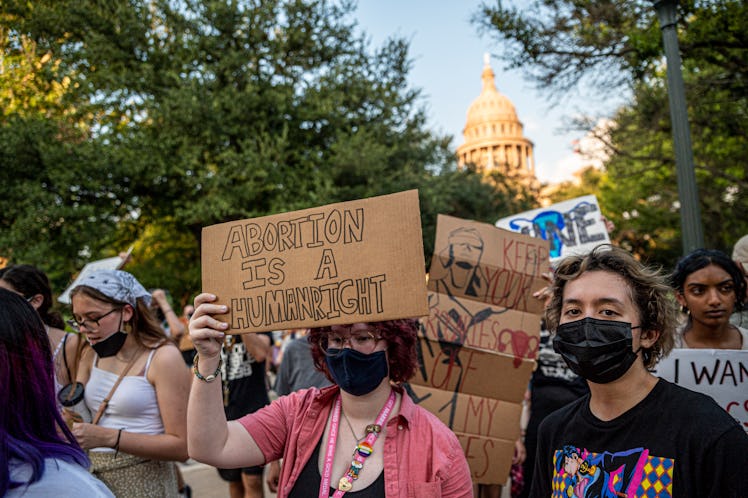
Here’s What To Know About Going Out Of State For Abortion Care
Just because it’s legal doesn’t mean it’s accessible.
Almost immediately after the Supreme Court officially overturned Roe v. Wade on June 24, states all over the country enacted some of the most restrictive anti-choice laws in the nation’s history. Things may only get worse, as some states are now moving to pass anti-choice laws restricting out-of-state travel for abortion access. So, can you still travel out of state for an abortion? Here’s what you should know about your options, now that the Constitution no longer protects your right to choose.
To date, it’s never been illegal in America to travel to another state for abortion care. “It is legal to have an abortion past six weeks in another state,” Tamara Marzouk, the director of abortion access at Advocates for Youth, told Elite Daily in a Sept. 21, 2021 interview. It’s also legal to support “someone in obtaining a legal abortion in another state,” she said, whether through providing financial support, transportation, or anything else that makes abortion care more accessible. In fact, when heavy restrictions on abortion go into effect in one state, it’s common for people to begin traveling to neighboring states to access abortion care. More than half a million women traveled outside their home state to have an abortion between 2012 and 2017, according to the Associated Press – and after Texas’ SB8 took effect in 2021, Planned Parenthood clinics in surrounding states saw a nearly 800% increase in patients seeking abortion care.
But now that the Supreme Court has issued its decision to overturn Roe and leave reproductive rights up to state lawmakers, that number will grow significantly. “We hold that Roe [v. Wade] and [Planned Parenthood v.] Casey must be overruled,” Justice Samuel Alito wrote in the June 24 majority opinion, referencing the two Supreme Court cases previously protecting the right to abortion. “The Constitution makes no reference to abortion, and no such right is implicitly protected by any constitutional provision.” According to NPR, as of June 24, 22 states harbor laws that either ban or severely restrict abortion access. Additionally, some states, like Missouri, have tried to pass legislation banning out-of-state travel for abortion access.
However, on June 24, Supreme Court Justice Brett Kavanaugh – who voted along with the majority to overturn Roe – wrote in a concurring opinion that states could not ban out-of-state travel to access abortion. “May a state bar a resident of that state from traveling to another state to obtain an abortion?” he wrote. “In my view, the answer is no, based on the constitutional right to interstate travel,” he added. However, just because it’s legal doesn’t mean it’s accessible. Out-of-state travel “adds time to the abortion experience, and abortion process in general, which makes [accessing] it even more difficult,” said Marzouk. As it is, abortion is already pricey: According to Planned Parenthood, a first trimester abortion can cost anywhere from $500 to $1,500. When factoring in travel costs, child care, overnight stays, waiting periods, and more, the overall cost of getting an out-of-state abortion could be thousands of dollars.
If you want to help others, or need help yourself, there are ways to make it happen. The National Network of Abortion Funds is a resource and directory meant to connect people seeking an abortion with the financial aid they need to access care — whether it be in another state, or another country altogether. Some abortion funds also offer financial aid for transportation, room and board while traveling, translation services, and more. However, there are other ways to access abortion care through the mail: Using online services, such as Plan C Pills or the Euki app, people are self-managing medication abortions with mifepristone and misoprostol up to 12 weeks of pregnancy. “[Self-managed abortion] is extremely safe and effective,” said Marzouk. “I would recommend they learn all of the information about safely self-managing an abortion.” Of course, in case of an emergency, it’s important to immediately seek professional medical care.
While anti-abortion lawmakers seem to be closing in on reproductive rights, it’s important to remember there’s still so much you can do to fight for abortion access in your state. You can volunteer at, or donate to, your local abortion fund, or join an advocacy program to help spread awareness on the importance of reproductive rights for all. For pregnancy capable people across the United States, abortion access remains critical health care.
This article was originally published on